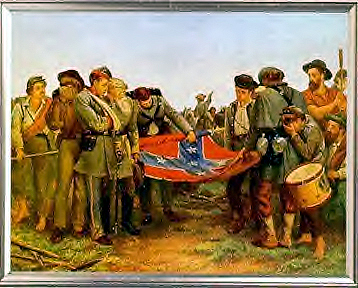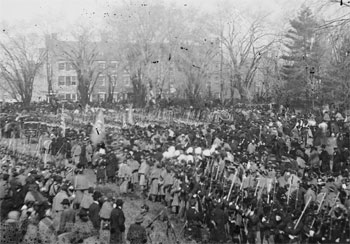Southern Collapse
An artist's stylized depiction of the Confederate capital's return to Montgomery, Alabama in June, 1863
War in the Carolinas
General Richard H. Anderson
Army of the Carolinas, Commander
After Lee’s surrender at Lynchburg, Major General Sedgwick wasted no time in heading south to capture the remnants of the Army of Northern Virginia, now referred to as the Army of the Carolinas. President Jefferson Davis realized that Richard H. Anderson, who was quickly promoted to full general, and his Army of the Carolinas was in no condition to face Sedgwick. With only 21,000 men, Anderson planned on flanking Sedgwick’s Army of the Potomac and wreaking havoc in the Union’s rear, possibly even reinvading Virginia. However, General Sedgwick’s superior numbers allowed him to block Anderson at every turn forcing him to fall back further south.
On May 24, 1863 a Union Army-Navy taskforce under Admiral David Farragut and Major General Ambrose Burnside landed on James Island near the entrance of Charleston Harbor. The Charleston defenses were under the command of the Confederate hero of Fort Sumter, General P.G.T. Beauregard. Burnside laid siege to Battery Wagner with the ultimate goal of taking the largest remaining city in the Confederacy.
Southern capital moves back to Montgomery
Having already fled Lynchburg before it fell, Jefferson Davis's government needed to establish a new capital. However unlike earlier in the war, many Southern governors now saw harboring the Confederate Government as more of a liability than an asset. Atlanta or a city in North Carolina were ruled out due to the hostility of the state governments. Governor of Georgia Joseph E. Brown even stated that the central government should “find another place to end its days.” Davis suggested that the capital be moved to either Charleston or Columbia, South Carolina until news came that Union forces had landed on James Island near the Charleston Harbor. Therefore the remaining members of the Confederate Congress decided to return the capital to Montgomery, Alabama.
The Confederate Civil War
What some Civil War historians call “The Confederate Civil War” began in earnest on June 15, 1863 when in a surprising move Confederate Vice President Alexander Stephens confronted President Davis in his makeshift office in Montgomery. Stephens claimed that the war was lost and that Davis should either sue for peace with Lincoln or resign as President. Jefferson Davis, whose relationship with Stephens was already severely strained, was deeply troubled at what he took to be treasonous comments from his Vice President. Davis stated that he had sworn to uphold the Confederate constitution and would do so for as long as he was able. Stephens then replied that if that was Davis’s answer he would be left with no choice but to urge Congress to impeach Davis.
The legality of impeaching Davis, presumably because of his abysmal conduct in running the war, was and has been hotly debated to this day. The constitution of the Confederate States of America maintains that the president may be impeached for “treason, bribery, or other high crimes and misdemeanors." Davis believed that the impeachment charges that he was brought up on were, at the very least baseless and more likely open treason against the Commander and Chief during wartime. For the next four days the so-called “Battle of Montgomery” raged as the Confederate capital became the scene of passionate debates, street battles, as both Davis and Stephens’s supporters clamored for votes. Some leaders even moved troops into the city to support their respective causes. However on June 19, Jefferson Davis received barely enough votes to stop from being removed as President of the Confederacy.
News of the “Battle of Montgomery” did much to discredit the Confederate government else wear in the South. As the Army of the Potomac was chasing Anderson’s forces across the state, Governor of North Carolina Zebulon Vance, a long time critic of Jefferson Davis, asked the state legislature to secede from the Confederacy. This was do to the central government’s apparent inability to defend the state and in an effort to stave off further destruction. On June 23, 1863 the state narrowly passed its second ordinance of secession in three years. Georgia followed North Carolina out of the Confederacy three days later. As such, Georgia and North Carolina troops started leaving the Confederate armies in droves.
The Surrender of Smith and Anderson
With North Carolina and Georgia now technically out of the Confederacy, the Confederate armies' positions within those states became untenable. Through a double envelopment Major General Sedgwick was able to trap Anderson’s army outside of Salisbury, North Carolina on June 27. Anderson was forced to surrender his battered and starving forces two days later.
Meanwhile in Georgia, Thomas’s Army of the Ohio inflicted a crippling defeat on Smith’s dwindling Army of Tennessee at Resaca on June 29. The devastating news of Anderson’s surrender in North Carolina reached Johnston the next day. This information along with the fact that the Georgia government would no longer supply his forces made Smith surrender his disintegrating army on July 1, 1863.
The Impeachment of Jefferson Davis
Alexander Stephens of Georgia
2nd President of the Confederacy
3-4 July, 1863
The succession of North Carolina and Georgia, coupled by the twin capitulations of the Confederate Armies of the Carolinas and Tennessee was the last straw for the Davis administration. Unlike the effort to remove Davis two weeks earlier, this result was never in doubt. On July 3, 1863 the Confederate Congress formally impeached and removed Jefferson Davis as President of the Confederacy. Vice President Alexander Stephens was sworn in as the second and last Confederate President at noon in a somber ceremony.
Battle of Selma
General John Bell Hood
Army of Mississippi, Commander
On the same afternoon news reached President Stephens that Major General Grant had finally caught up with General John Bell Hood's Army of Mississippi only 50 miles west of Montgomery at Selma. During the brief but costly battle, General Hood tried in vain to stem the relentless Yankee tide. Cutoff and surrounded, Hood was forced to surrender around noon after a few hours of desperate fighting.
Dissolution of the Confederate States of America
In light on the disastrous developments of the past weeks, President Alexander Stephens and the remaining members of Congress officially dissolved the Confederate States of America in a tearful cession at 10:00am on July 4, 1863 as the Star and Bars was lowered for the last time from over the city. When news reached the North later that day, it sparked off the greatest Independence Day celebrations that the nation had ever seen. In a torch light speech delivered to an audience on the White House lawn President Abraham Lincoln stated that “the Almighty God has seen fit to bless us with victory in this great civil war, but it will be up to us to win the peace.”
Confederate States of America
February 8, 1861 - July 4, 1863












